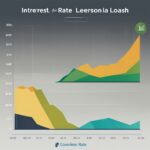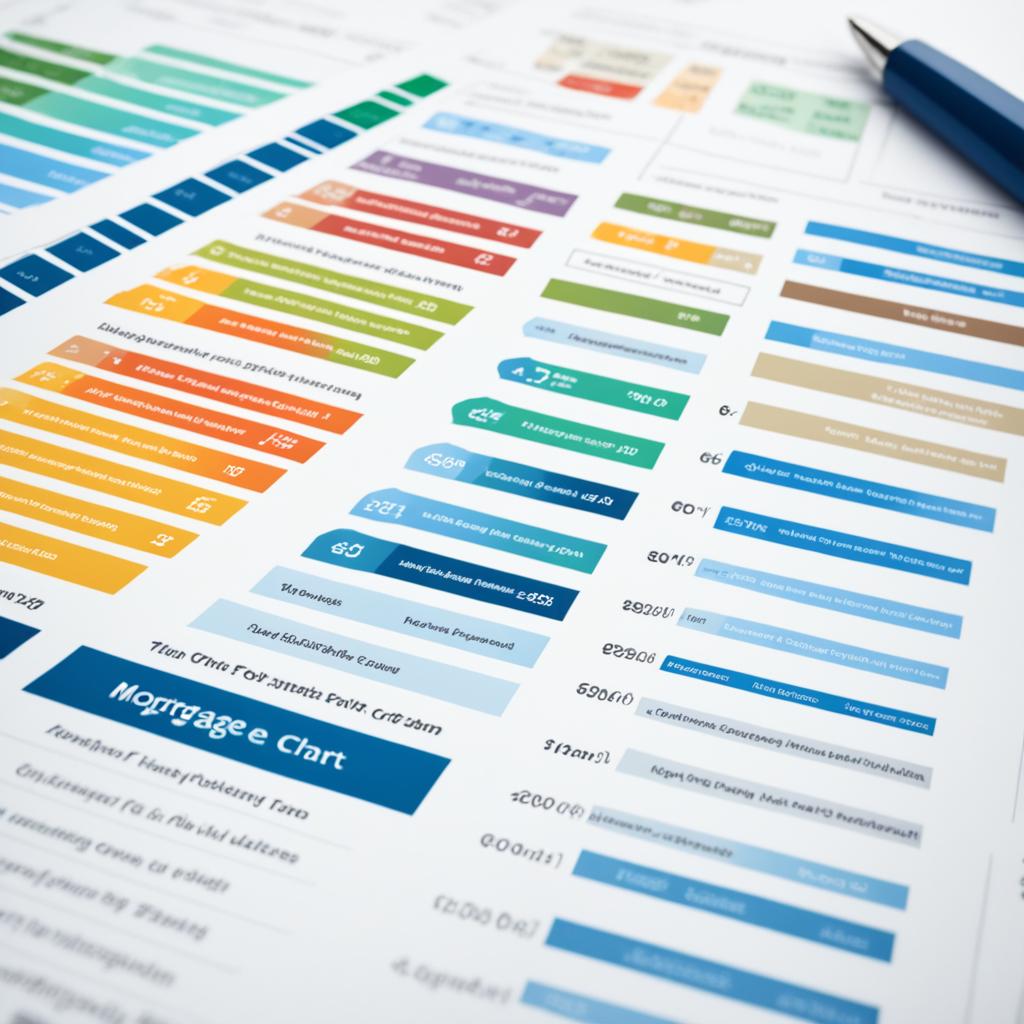Looking for the best mortgage rates? Want to save money on your home loan? You’ve come to the right place. In this article, I will guide you through the process of comparing mortgages and finding the best deal for your needs. Whether you’re a first-time homebuyer or looking to refinance your existing mortgage, understanding mortgage rates and terms is essential for making an informed decision.
A mortgage comparison allows you to compare different lenders and their rates, giving you the opportunity to find the most favorable interest rate and loan terms. By using a mortgage calculator, you can calculate monthly payments and interest costs for multiple loan options, helping you choose the best mortgage for your financial situation. Take control of your mortgage journey and find the best deal for you.
Key Takeaways:
- Use a mortgage comparison tool to compare lenders and their rates.
- Utilize a mortgage calculator to calculate monthly payments and interest costs.
- Consider factors such as loan duration, APR, and loan eligibility.
- Shop around for the best mortgage rates and terms.
- Work with a trusted lender to ensure a smooth mortgage process.
Understanding Mortgage Interest Rates
When it comes to getting a mortgage, one of the most important factors to consider is the interest rate. Mortgage interest rates have a significant impact on the overall cost of borrowing and can greatly affect your monthly payments and the total interest paid over the life of the loan. Understanding how interest rates work and comparing different rates is essential to make an informed borrowing decision.
Lower interest rates generally mean lower monthly payments and less total interest paid. This can save you thousands of dollars over the life of your mortgage. On the other hand, higher interest rates can increase your monthly payments and make homeownership more expensive in the long run.
When comparing mortgage options, it’s crucial to consider the interest rates offered by different lenders. By shopping around and comparing loan terms, you can find the best interest rate that suits your needs and financial situation.
| Lender | Interest Rate |
|---|---|
| Bank A | 3.25% |
| Bank B | 3.50% |
| Bank C | 3.75% |
Use loan comparison tools to see the impact of different interest rates on your monthly payments and the total interest paid. These tools provide valuable insights into how your mortgage payments can vary depending on the interest rate offered by each lender.
By understanding and comparing mortgage interest rates, you can make an informed borrowing decision that fits your financial goals and saves you money in the long run.
Types of Mortgage Loans
When it comes to home loans, there are various options available to borrowers. Understanding the different types of mortgage loans can help you make an informed decision and find the best financing option for your needs.
Conventional Loans
Conventional loans are the most common type of mortgage loans. These loans are not insured or guaranteed by the government, making them a popular choice for borrowers with good credit scores and stable income. Conventional loans typically require a down payment of at least 3% to 20% of the home’s purchase price.
FHA Loans
Federal Housing Administration (FHA) loans are backed by the government and are designed to help borrowers with lower credit scores and a smaller down payment. FHA loans offer more flexible eligibility requirements and often have lower interest rates compared to conventional loans. With an FHA loan, you may be able to qualify with a down payment as low as 3.5%.
USDA Loans
The United States Department of Agriculture (USDA) offers loans for eligible borrowers in rural areas. USDA loans provide 100% financing, meaning no down payment is required. These loans have income limits and are specifically designed to help low-to-moderate-income borrowers achieve homeownership in rural communities.
VA Loans
The Department of Veterans Affairs (VA) offers VA loans to eligible active-duty service members, veterans, and surviving spouses. VA loans often have more favorable terms, including no down payment requirement and competitive interest rates. These loans are designed to support veterans and their families in achieving homeownership.
Researching and comparing different types of mortgage loans can help you understand the eligibility requirements, terms, and interest rates associated with each option. By exploring the different loan types, you can find the one that best suits your needs and financial circumstances.
If you already have a mortgage, you may also consider refinancing options. Refinancing allows you to replace your current loan with a new one, potentially offering lower interest rates or different loan terms. Refinancing can help you save money on your monthly payments or pay off your mortgage faster.
| Loan Type | Eligibility Requirements | Down Payment | Interest Rates |
|---|---|---|---|
| Conventional Loans | Good credit, stable income | 3% – 20% | Varies |
| FHA Loans | Lower credit scores | 3.5% | Competitive |
| USDA Loans | Low-to-moderate income, rural areas | 0% | Varies |
| VA Loans | Qualifying military service | 0% | Competitive |
Factors Affecting Mortgage Rates
When comparing mortgage options, it’s important to understand the factors that influence mortgage rates. These factors can have a significant impact on the interest rate you’ll be offered for your home loan. By considering these factors, you can make informed decisions that align with your financial goals and save you money in the long run.
Credit Score
One of the key factors that lenders consider when determining your mortgage interest rate is your credit score. Your credit score reflects your creditworthiness and helps lenders assess the risk of lending to you. Generally, a higher credit score means you’re more likely to be offered lower interest rates. Conversely, a lower credit score may result in higher interest rates or even loan denial.
To improve your credit score, focus on making timely payments, reducing your credit utilization ratio, and clearing any outstanding debts. Regularly monitoring your credit report and addressing any inaccuracies is also essential.
Loan-to-Value Ratio and Loan Amount
Another factor that can affect mortgage rates is your loan-to-value (LTV) ratio, which compares the loan amount to the appraised value of the property. A lower LTV ratio indicates that you have more equity in the property, reducing the lender’s risk. As a result, a lower LTV ratio may lead to lower interest rates.
The loan amount itself can also impact the interest rate. Generally, larger loan amounts may come with higher interest rates, as they represent a greater risk for the lender. Keeping your loan amount within reasonable limits and considering a higher down payment can help secure more favorable rates.
Loan Terms
Loan terms, such as the length of the loan and the type of interest rate (fixed or variable), also play a role in mortgage rates. Generally, shorter loan terms, such as 15-year mortgages, tend to have lower interest rates compared to longer terms, such as 30-year mortgages. However, shorter loan terms may come with higher monthly payments.
The type of interest rate can also affect mortgage rates. Fixed-rate mortgages offer stability, with the interest rate remaining the same throughout the loan term. On the other hand, variable-rate mortgages, such as adjustable-rate mortgages (ARMs), can have lower initial rates but may fluctuate over time.
When comparing mortgage options, consider these loan terms and weigh the pros and cons of each to determine the best fit for your financial circumstances.
By understanding how factors like credit score, loan-to-value ratio, loan amount, and loan terms affect mortgage rates, you can make informed decisions when comparing and selecting a mortgage. Remember to consider these factors alongside other essential aspects, such as closing costs and loan eligibility, to find the best mortgage option for you.
The Importance of a Good Credit Score
Your credit score plays a significant role in determining your mortgage interest rate and loan eligibility. Lenders use your credit score to assess your creditworthiness and the level of risk associated with lending to you.
Having a good credit score can greatly benefit you when it comes to obtaining a mortgage. It can open doors to lower interest rates and better loan terms, ultimately saving you money in the long run. On the other hand, a poor credit score can make it more difficult to secure a mortgage or result in higher interest rates that can strain your finances.
How can you improve your credit score? Here are a few steps you can take:
- Pay your bills on time: Consistently paying your bills by their due dates shows lenders that you are responsible and capable of managing your finances.
- Reduce your debt: Lowering your overall debt, especially credit card debt, can have a positive impact on your credit score. Aim to keep your credit utilization ratio below 30%.
- Avoid new credit applications: Applying for multiple credit cards or loans within a short period of time can raise concerns among lenders. Minimize new credit inquiries to maintain a stable credit profile.
- Monitor your credit report: Regularly check your credit report for errors or inaccuracies that may be negatively affecting your score. If you find any discrepancies, report them to the credit bureaus and have them corrected.
By taking these steps to improve your credit score, you can increase your chances of qualifying for a mortgage with favorable interest rates and loan terms. Remember that building a good credit score takes time, so it’s important to start early and stay consistent with your financial habits.
Quote:
“Your credit score is a window into your financial responsibility. Maintaining a good score demonstrates that you are a reliable borrower, making lenders more willing to offer you favorable mortgage rates and loan terms.”
Building and maintaining a good credit score is well worth the effort, as it can save you thousands of dollars over the life of your mortgage. Start working towards improving your credit score today to increase your chances of securing the best mortgage rates and loan eligibility.
Understanding APR in Mortgage Comparison
When comparing mortgages, it’s crucial to have a clear understanding of the annual percentage rate (APR). The APR includes not only the interest rate but also additional fees and costs associated with the loan, such as closing costs. By considering the APR, you can get a more accurate picture of the total cost of the loan and make an informed decision.
While the interest rate is an essential factor in comparing mortgages, it doesn’t provide a complete view of the loan’s cost. The APR incorporates the interest rate and other expenses, such as points, origination fees, and mortgage insurance.
Comparing APRs allows you to evaluate loan options side by side and determine which one is the most affordable in the long run. A lower APR typically indicates lower overall borrowing costs, making it an important metric when examining mortgage offers from different lenders.
It’s important to note that APRs may vary among lenders due to differences in fees and costs. A lender with a lower interest rate may have higher closing costs, resulting in a higher APR. Therefore, it’s crucial to consider both the interest rate and the APR when comparing mortgage options.
To illustrate the significance of APR in mortgage comparison:
Suppose you are comparing two mortgage offers: Offer A with an interest rate of 4.5% and closing costs of $2,500, and Offer B with an interest rate of 4.75% and closing costs of $1,500. Without considering the APR, you might be inclined to choose Offer A because of its lower interest rate. However, once you factor in the closing costs, Offer B might actually be the better option with a lower overall cost.
Here’s a table that highlights the importance of APR in mortgage comparison:
| Mortgage Offer | Interest Rate | Closing Costs | APR |
|---|---|---|---|
| Offer A | 4.5% | $2,500 | 4.61% |
| Offer B | 4.75% | $1,500 | 4.82% |
As you can see from the table, even though Offer A has a lower interest rate, the higher closing costs result in a slightly higher APR compared to Offer B. By considering the APR, you can make a more informed decision based on the total cost of the loan.
Understanding the APR when comparing mortgages empowers you to choose the loan that best fits your financial situation. Remember to evaluate both the interest rate and the APR, as well as factor in other costs like closing costs, to make an informed decision that aligns with your long-term goals.
The Impact of Loan Duration
When choosing a loan for your mortgage, one important factor to consider is the loan duration. The loan duration refers to the length of time you will have to repay the loan, such as 15 years or 30 years. This decision has a significant impact on both your monthly payments and the total interest you will pay over the life of the loan.
Shorter loan durations often come with higher monthly payments compared to longer loan durations, but they can save you money in the long run. This is because shorter loan durations result in less total interest paid over time. On the other hand, longer loan durations may offer lower monthly payments, but you will end up paying more interest over the course of the loan.
To make an informed decision, it’s important to compare different loan durations and consider your financial goals. If your priority is to pay off your mortgage as quickly as possible and save on interest costs, a shorter loan duration may be the right choice. However, if you need more flexibility in your monthly budget and prefer lower monthly payments, a longer loan duration may be more suitable.
Let’s take a look at a hypothetical example to illustrate the impact of loan duration on monthly payments and total interest paid:
| Loan Duration | Monthly Payment | Total Interest Paid |
|---|---|---|
| 15 years | $1,753 | $109,463 |
| 30 years | $1,265 | $195,668 |
In the example above, a 15-year loan duration has a higher monthly payment of $1,753 compared to a 30-year loan duration with a monthly payment of $1,265. However, the total interest paid over the life of the loan is significantly less for the 15-year loan at $109,463 compared to $195,668 for the 30-year loan.
By comparing loan durations and considering your financial situation, you can find the right balance between affordable monthly payments and minimizing interest costs. Keep in mind that other factors, such as the interest rate and loan terms, also play a role in determining the overall cost of the loan. Take the time to explore your options and make an informed decision that aligns with your financial goals.
Determining Affordability with a Mortgage Calculator
A mortgage calculator is an invaluable tool when it comes to determining the affordability of a mortgage. It allows you to enter crucial details such as the loan amount, interest rate, and loan duration, to calculate your monthly payments. By considering your monthly budget and financial goals, the mortgage calculator helps you make an informed decision and choose a mortgage option that aligns with your financial capabilities and long-term plans.
When using a mortgage calculator, it’s essential to take into account your monthly budget. Consider your income, expenses, and other financial obligations to understand how much you can comfortably afford to spend on your mortgage each month. This ensures that you don’t overextend yourself and maintain a healthy financial position in the long run.
Planning Your Monthly Budget
Creating a monthly budget is a fundamental aspect of determining your loan affordability. Start by listing all your sources of income and deducting your fixed expenses, including utilities, groceries, and transportation costs. Allocate a portion of your budget towards savings and personal expenses.
With a clear understanding of your monthly income and expenses, you can accurately assess how much you can allocate towards your mortgage payment. Consider the impact of your monthly mortgage payment on your overall budget and ensure that it allows you to meet your other financial obligations comfortably.
Here’s an example of how a monthly budget might be structured:
| Income | Amount |
|---|---|
| Salary | $5,000 |
| Rental Income | $500 |
| Total Income | $5,500 |
| Expenses | Amount |
| Mortgage Payment | $1,200 |
| Utilities | $200 |
| Groceries | $400 |
| Transportation | $300 |
| Savings | $500 |
| Personal Expenses | $400 |
| Total Expenses | $3,000 |
In this example, the individual has a monthly income of $5,500 and total expenses of $3,000, leaving a surplus of $2,500. By allocating $1,200 towards their mortgage payment, they still have $1,300 remaining to cover their other financial obligations and savings goals.
Using a mortgage calculator in conjunction with a comprehensive monthly budget can provide you with a clear picture of your affordability. It allows you to make informed decisions about the loan amount, interest rate, and loan duration that suit your financial goals and constraints.

Shopping Around for the Best Mortgage Rates
When it comes to finding the best mortgage rates, it’s essential not to settle for the first offer that comes your way. Shopping around and comparing different mortgage rate options can help you secure the most favorable terms and potentially save a significant amount of money.
One effective way to compare mortgage rates is to gather loan offers from multiple lenders. By obtaining quotes from different lenders, you can see the range of interest rates and loan terms available to you. This allows you to make an informed decision based on a comprehensive mortgage rate comparison.
Pre-approval from lenders can also give you an advantage when negotiating rates. Getting pre-approved means that a lender has reviewed your financial information and determined the loan amount you can qualify for. Pre-approval shows sellers that you are a serious buyer, and it can help you negotiate better terms, including lower interest rates.
When comparing mortgage offers, consider factors such as interest rates, closing costs, and loan terms. Interest rates determine the amount of interest you’ll pay over the life of the loan, so finding the best rate is crucial. Closing costs are also an important consideration, as they can significantly impact the overall cost of your mortgage. Additionally, evaluate the loan terms, such as the length of the loan and whether it’s a fixed or adjustable rate loan.
To help you visualize the mortgage rate comparison process, here’s a table comparing the interest rates and loan terms from three different lenders:
| Lender | Interest Rate | Closing Costs | Loan Term |
|---|---|---|---|
| Lender A | 3.25% | $2,500 | 30 years |
| Lender B | 3.30% | $3,000 | 15 years |
| Lender C | 3.15% | $2,000 | 20 years |
As you can see from the table, even a small difference in interest rates can have a significant impact on your monthly payments and the total interest paid over the life of the loan. It’s worth taking the time to compare multiple offers and explore your options.
By shopping around, gathering loan offers, and considering important factors such as interest rates, closing costs, and loan terms, you can make an informed decision and secure the best mortgage rate for your financial situation. Don’t hesitate to reach out to lenders and explore pre-approval options to give yourself the upper hand in negotiations. Remember, finding the best mortgage rate can save you thousands of dollars in the long run.
Working with a Trusted Mortgage Lender
When it comes to securing a mortgage, choosing a trusted lender is vital to ensure a smooth and successful process. By partnering with a reputable and reliable mortgage provider, you can have peace of mind throughout the application process and increase your chances of obtaining favorable rates.
In your search for a trusted lender, it’s essential to conduct thorough research and consider multiple factors. Start by reading customer reviews to gain insights into the lender’s reputation and customer satisfaction. Look for lenders who consistently receive positive feedback and have a strong track record of delivering excellent service.
Consider the following factors when evaluating lenders:
- Customer Service: Assess how the lender interacts with customers and handles inquiries and concerns. A lender with responsive and attentive customer service will provide the support you need during the application and closing process.
- Loan Application Process: Look for a lender with a streamlined and efficient application process. A smooth application experience can save you time and hassle, ensuring that you can move forward with confidence.
- Competitive Rates: Compare the interest rates offered by different lenders to ensure you secure the most favorable terms for your mortgage. Be sure to consider both the interest rate and the overall loan package when evaluating the lender’s competitiveness.
Working with a trusted mortgage lender offers numerous benefits. Not only can it make the mortgage process more straightforward and less stressful, but it can also provide you with access to better loan options and terms.+
“Choosing a reputable lender is crucial for a smooth mortgage experience. From excellent customer service to competitive rates, a trusted lender can make all the difference in securing your dream home.”– Sarah Thompson
Remember, securing a mortgage is a significant financial decision. Take the time to select a trusted lender who aligns with your needs and goals. By partnering with a reputable mortgage provider and leveraging their expertise, you can navigate the mortgage application process with confidence and secure a loan that fits your financial situation.
| Benefits of a Trusted Mortgage Lender |
|---|
| Superior customer service |
| Efficient and streamlined application process |
| Access to competitive rates and loan options |
| Expert guidance throughout the mortgage process |
The Benefits of Mortgage Pre-Approval
When comparing mortgage options, obtaining mortgage pre-approval offers several advantages. Pre-approval provides a clear understanding of your loan eligibility and empowers you to set a realistic budget for your home search, ensuring you focus on properties within your price range. In addition, pre-approval gives you the opportunity to lock in an interest rate, safeguarding you from potential rate increases that may occur during the homebuying process. By securing pre-approval from multiple lenders, you can compare offers and negotiate to secure the best rate possible.
| Benefits of Mortgage Pre-Approval |
|---|
| 1. Clear understanding of loan eligibility |
| 2. Ability to set a realistic budget |
| 3. Opportunity to lock in an interest rate |
| 4. Protection from potential rate increases |
| 5. Comparative analysis for securing the best rate |
With mortgage pre-approval, you can confidently navigate the homebuying process, knowing your loan eligibility and securing a favorable interest rate. Take the time to gather pre-approval from multiple lenders to expand your options and secure the best rate for your mortgage. This proactive approach puts you in a stronger position as you make one of the most significant financial decisions in your life.

Government Programs for Homebuyers
As a homebuyer, you have access to government programs that can provide additional benefits and support. These programs include FHA loans, USDA loans, and VA loans, each designed to cater to specific eligibility criteria and circumstances. Let’s explore these programs and see how they can help you achieve your dream of homeownership.
FHA Loans
FHA loans, insured by the Federal Housing Administration, are an excellent option for first-time homebuyers. These loans often have lower down payment requirements, making homeownership more accessible. With an FHA loan, you may be able to secure financing with a down payment as low as 3.5% of the purchase price, compared to the typical 20% down payment required for conventional loans. This makes FHA loans an attractive choice for those with limited savings or lower credit scores.
USDA Loans
If you’re a low-to-moderate-income borrower looking to purchase a home in a rural area, USDA loans could be the perfect fit. These loans, offered by the U.S. Department of Agriculture, provide financing options with attractive interest rates and relaxed eligibility requirements. USDA loans aim to promote rural development and homeownership by offering affordable financing to those who may not qualify for traditional mortgages. If you dream of living in a peaceful rural community, explore USDA loans to see if you’re eligible.
VA Loans
If you’re a veteran or a current member of the military, VA loans can be an excellent option to consider. Guaranteed by the U.S. Department of Veterans Affairs, these loans offer competitive interest rates and flexible eligibility criteria. VA loans provide opportunities for veterans and military members to become homeowners by offering favorable terms, including zero down payment options in some cases. If you’re eligible for a VA loan, take advantage of this exclusive benefit and explore the options available to you.
By exploring these government programs for homebuyers, you can potentially unlock additional benefits and find a loan that suits your unique needs and financial situation. Whether it’s the lower down payment requirements of FHA loans, the affordability of USDA loans, or the advantages of VA loans for veterans and military members, these programs can make your homeownership journey more accessible and affordable.
Make sure to research the eligibility requirements, compare the benefits and terms of each program, and consult with a trusted mortgage lender to determine the best government program for your homebuying needs.
| Government Program | Main Benefits | Eligibility Criteria |
|---|---|---|
| FHA Loans | Lower down payment requirements Accessible financing for first-time homebuyers |
– Minimum credit score – Stable employment and income – Primary residence – Property requirements |
| USDA Loans | Affordable financing in rural areas Attractive interest rates |
– Income limitations – Property location in eligible rural areas – Primary residence – Property requirements |
| VA Loans | Competitive interest rates Flexible eligibility criteria Zero down payment options |
– Military service or veteran status – Certificate of Eligibility – Primary residence – Property requirements |
Finalizing Your Mortgage Decision
After comparing various mortgage options and receiving multiple offers, it’s time to finalize your mortgage decision. This is a crucial step where you consider several factors to make an informed choice that aligns with your financial goals and preferences.
Here are the key factors to consider when finalizing your mortgage decision:
- Interest Rates: Carefully analyze the interest rates offered by different lenders. A lower interest rate can significantly impact your monthly payments and the total amount you pay over the life of the loan.
- Loan Terms: Evaluate the terms of each loan option, such as the duration, whether it’s a fixed-rate or adjustable-rate mortgage, and any prepayment penalties. Choose loan terms that best suit your financial situation and long-term plans.
- Closing Costs: Take into account the closing costs associated with each mortgage offer. These costs can include appraisal fees, title insurance, loan origination fees, and more. Compare the closing costs to determine the overall expense of each option.
- Customer Reviews: Read customer reviews and testimonials of the lenders you are considering. Positive reviews indicate a lender’s reliability, excellent customer service, and timely processing of loan applications.
Once you’ve considered these factors, it’s time to work closely with your chosen lender to navigate the closing process smoothly. Your lender will guide you through the necessary steps, including preparing all required documents, arranging for an appraisal, and coordinating with the title company.
Before finalizing your mortgage, carefully review all loan documents. Understand the loan terms, repayment obligations, and any additional costs or fees associated with the loan. If you have any questions or concerns, do not hesitate to ask your lender for clarification.
Remember, the mortgage decision-making process is an important one. Taking the time to thoroughly evaluate your options and collaborating closely with your lender will help ensure a seamless and successful mortgage experience.
Comparing Mortgage Offers
| Lender | Interest Rate | Loan Term | Closing Costs | Customer Reviews |
|---|---|---|---|---|
| Lender A | 3.25% | 30 years | $5,000 | 4.9/5 |
| Lender B | 3.15% | 30 years | $6,000 | 4.8/5 |
| Lender C | 3.35% | 30 years | $4,500 | 4.7/5 |
Visualizing the information in a table format can help you compare different mortgage offers more effectively. The table above provides a side-by-side comparison of three lenders based on their interest rates, loan terms, closing costs, and customer reviews. Use this as a reference to guide your final decision.
Conclusion
When it comes to securing a mortgage, conducting a thorough mortgage comparison is essential in order to find the best mortgage rates and terms for your specific needs. Utilizing online tools, such as mortgage calculators and rate comparison tools, is a great way to gather information and compare offers from different lenders.
As you evaluate different mortgage options, be sure to consider important factors such as interest rates, loan terms, and closing costs. These variables can have a significant impact on the overall affordability and long-term financial implications of your mortgage. By taking the time to compare and make an informed decision, you can secure a mortgage that aligns with your financial goals and saves you a substantial amount of money in the process.
Remember, a mortgage is a significant financial commitment, and the decision should not be taken lightly. By conducting a comprehensive mortgage comparison and carefully considering all relevant variables, you can feel confident in your loan decision and ensure that you are getting the best possible rates and terms available in the market.
FAQ
What is a mortgage comparison tool?
Why is it important to compare mortgage rates?
How can a mortgage calculator help in comparing home loans?
What factors should I consider when comparing mortgage options?
How does my credit score impact mortgage rates?
What is APR, and why is it important in mortgage comparison?
How does loan duration impact my mortgage payments and interest costs?
How can I determine my loan affordability with a mortgage calculator?
Why is it important to shop around for the best mortgage rates?
How do I choose a reputable mortgage lender?
What are the benefits of mortgage pre-approval?
What government programs are available for homebuyers?
How do I finalize my mortgage decision?
What should I keep in mind when conducting a mortgage comparison?
Source Links
- https://www.mortgagecalculator.org/calcs/compare.php
- https://www.bankrate.com/mortgages/30-year-mortgage-rates/
- https://www.bankrate.com/mortgages/mortgage-rates/
Money posts:
 Low Interest Personal Loans: Find the Best Rates (2024)
Low Interest Personal Loans: Find the Best Rates (2024)
 Emergency Same Day Loans: A Lifesaver or Trap? (2024)
Emergency Same Day Loans: A Lifesaver or Trap? (2024)
 Allocated Waiver Mortgage: Simplify Your Home Loan (2024)
Allocated Waiver Mortgage: Simplify Your Home Loan (2024)
 FHA Loans: Your Ticket to Homeownership (2024)
FHA Loans: Your Ticket to Homeownership (2024)
 Apply for Car Loan: Easy Steps to Your Dream Car (2024)
Apply for Car Loan: Easy Steps to Your Dream Car (2024)
 Buy a House with No Money Down: Is It Possible? The dream of homeownership is within reach, even if you don’t have a substantial down payment. As a first-time home buyer, you may be wondering: Can you buy a house with no money down? The answer is yes! There are options available that can help you achieve your goal of owning a home without a large upfront payment. Key Takeaways: It is possible to buy a house with no money down, especially as a first-time home buyer. Specific first-time home buyer loans and assistance programs offer the opportunity to purchase a home with zero down payment. Government grants and loans are available to offset the initial costs of homeownership, such as closing costs. As a first-time homebuyer, you can take advantage of first-time homebuyer loans that require no down payment. These loans, such as the FHA loan and Conventional 97, allow for as little as 3% down. Additionally, there are government grants and loans available that can further offset the upfront costs of purchasing a home. While conventional and FHA loans typically require a minimum 3% to 3.5% down payment, exceptional options exist for certain groups. Veterans and rural homebuyers with moderate to low incomes may qualify for zero down payment loans. These programs open the door to homeownership without the need for a substantial upfront payment. Low down payment options are also available for first-time homebuyers. FHA loans, for instance, require a down payment as low as 3.5%, making homeownership more attainable for individuals with limited funds. Additionally, there are various low-income homebuyer programs at both the state and federal levels that offer grants or low-interest loans to cover down payments and closing costs. Government-backed loans, such as VA loans and USDA loans, are zero-down mortgages that make it possible for buyers with limited financial flexibility to purchase a home without a large upfront down payment. VA loans cater to military veterans and offer benefits like no down payment and no mortgage insurance. USDA loans promote homeownership in rural and certain suburban areas, also with no down payment required. If you’re wondering how to cover the down payment, there are options available. Down payment assistance programs offer grants or low-interest loans to help cover down payments and closing costs. Another option is receiving a down payment gift from a family member, which can help reduce the upfront expenses. It’s important to note that lenders often require a gift letter stating that the money is a gift and not a loan. In conclusion, buying a house with no money down is possible through various first-time homebuyer loans and assistance programs. These options eliminate the need for a traditional down payment, making homeownership more accessible for individuals with limited upfront funds. Whether you qualify for a zero-down payment loan, a low-down-payment option, or assistance programs, it’s important to explore all available options and work with a trusted lender or home lending expert to find the best mortgage solution for your unique situation and goals.
Buy a House with No Money Down: Is It Possible? The dream of homeownership is within reach, even if you don’t have a substantial down payment. As a first-time home buyer, you may be wondering: Can you buy a house with no money down? The answer is yes! There are options available that can help you achieve your goal of owning a home without a large upfront payment. Key Takeaways: It is possible to buy a house with no money down, especially as a first-time home buyer. Specific first-time home buyer loans and assistance programs offer the opportunity to purchase a home with zero down payment. Government grants and loans are available to offset the initial costs of homeownership, such as closing costs. As a first-time homebuyer, you can take advantage of first-time homebuyer loans that require no down payment. These loans, such as the FHA loan and Conventional 97, allow for as little as 3% down. Additionally, there are government grants and loans available that can further offset the upfront costs of purchasing a home. While conventional and FHA loans typically require a minimum 3% to 3.5% down payment, exceptional options exist for certain groups. Veterans and rural homebuyers with moderate to low incomes may qualify for zero down payment loans. These programs open the door to homeownership without the need for a substantial upfront payment. Low down payment options are also available for first-time homebuyers. FHA loans, for instance, require a down payment as low as 3.5%, making homeownership more attainable for individuals with limited funds. Additionally, there are various low-income homebuyer programs at both the state and federal levels that offer grants or low-interest loans to cover down payments and closing costs. Government-backed loans, such as VA loans and USDA loans, are zero-down mortgages that make it possible for buyers with limited financial flexibility to purchase a home without a large upfront down payment. VA loans cater to military veterans and offer benefits like no down payment and no mortgage insurance. USDA loans promote homeownership in rural and certain suburban areas, also with no down payment required. If you’re wondering how to cover the down payment, there are options available. Down payment assistance programs offer grants or low-interest loans to help cover down payments and closing costs. Another option is receiving a down payment gift from a family member, which can help reduce the upfront expenses. It’s important to note that lenders often require a gift letter stating that the money is a gift and not a loan. In conclusion, buying a house with no money down is possible through various first-time homebuyer loans and assistance programs. These options eliminate the need for a traditional down payment, making homeownership more accessible for individuals with limited upfront funds. Whether you qualify for a zero-down payment loan, a low-down-payment option, or assistance programs, it’s important to explore all available options and work with a trusted lender or home lending expert to find the best mortgage solution for your unique situation and goals.
 Secured Loan with a Financed Car: How-To Guide (2024)
Secured Loan with a Financed Car: How-To Guide (2024)
 Home Improvement Loans: Renovate Your Dream Home (2024)
Home Improvement Loans: Renovate Your Dream Home (2024)

